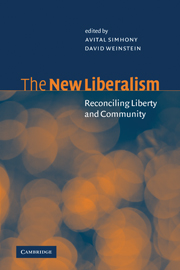Book contents
- Frontmatter
- Contents
- List of contributors
- Acknowledgments
- Introduction: The new liberalism and the liberal–communitarian debate
- 1 Liberal community: an essay in retrieval
- 2 T. H. Green on individual rights and the common good
- 3 T. H. Green's complex common good: between liberalism and communitarianism
- 4 Private property, liberal subjects, and the state
- 5 Neutrality, perfectionism, and the new liberal conception of the state
- 6 Bosanquet's communitarian defense of economic individualism: a lesson in the complexities of political theory
- 7 The new liberalism and the rejection of utilitarianism
- 8 Staunchly modern, non-bourgeois liberalism
- 9 The new liberalism and citizenship
- Select bibliography
- Index
9 - The new liberalism and citizenship
Published online by Cambridge University Press: 06 July 2010
- Frontmatter
- Contents
- List of contributors
- Acknowledgments
- Introduction: The new liberalism and the liberal–communitarian debate
- 1 Liberal community: an essay in retrieval
- 2 T. H. Green on individual rights and the common good
- 3 T. H. Green's complex common good: between liberalism and communitarianism
- 4 Private property, liberal subjects, and the state
- 5 Neutrality, perfectionism, and the new liberal conception of the state
- 6 Bosanquet's communitarian defense of economic individualism: a lesson in the complexities of political theory
- 7 The new liberalism and the rejection of utilitarianism
- 8 Staunchly modern, non-bourgeois liberalism
- 9 The new liberalism and citizenship
- Select bibliography
- Index
Summary
Both the terms “new liberalism” and “citizenship” have intricate relations to late nineteenth- and twentieth-century politics. The term “new liberalism” is still occasionally confused with the term “neo-liberalism” – the latter is usually taken as a synonym for the liberal new right of the 1980s, which stands in overt opposition to the new liberalism. It is important to bear in mind here that liberalism is a complex and intricate body of thought. It is not a uni-dimensional tradition. Classical liberalism has often been singled out by theorists as the most important dimension; however, this seriously neglects other important and distinctive strands of thought within liberalism, not least the powerful and immensely influential tradition of the “new liberalism.”
“Citizenship” also embodies an ambiguous conceptual legacy. It is a term which has gone in and out of fashion from the nineteenth century to the present. To raise the issue of the concept of citizenship from the late 1960s, even up to the very early 1980s, was seen as either quaint or archaic. However, times have changed and citizenship is once more fully back in vogue. Unlike “citizenship,” however, the term “new liberalism” still has an awkward feel to it in discussions of political theory. Republicanism, classical liberalism and libertarianism, communitarianism, Marxism, feminism, and neo-Aristotelianism flourish in contemporary anglophone political theory, but one hardly ever finds a reference to the new liberalism as a coherent or distinctive view.
- Type
- Chapter
- Information
- The New LiberalismReconciling Liberty and Community, pp. 205 - 227Publisher: Cambridge University PressPrint publication year: 2001
- 3
- Cited by



